New partnership announced with Borderless
Sona and Borderless announce an exciting partnership.
Building a staff schedule couldn’t be easier.
Reduce payroll errors with real-time T&A.
Fill 50% more shifts with your own employees.
Ensure shifts are covered even if you're understaffed.
Manage absence requests and approvals.
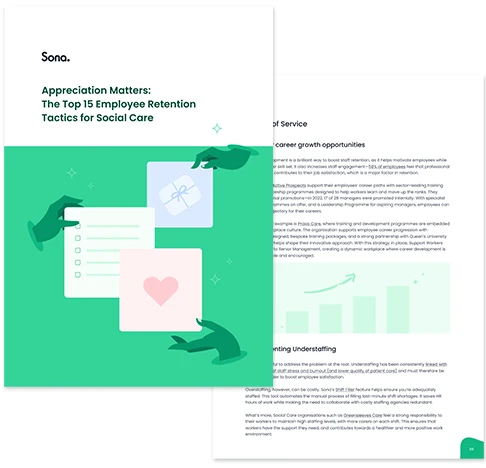
Practical ways to boost team morale with proven examples from across the sector.
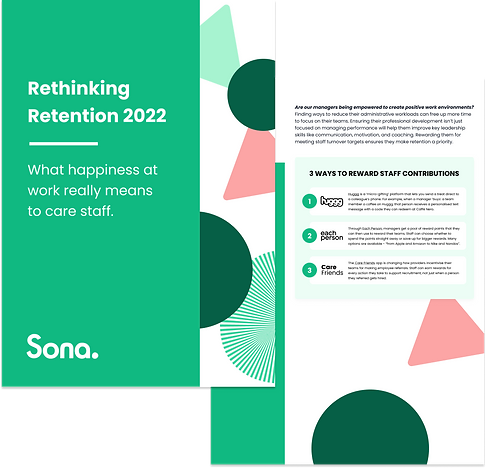
Find out what care employees say matters to them most at work.
Search and view employees with customised permission levels.
Key employment information all in one place.
Store visas, professional certifications and more with easy access.
Control personal and operational details of your staff.

Why are people leaving Social Care, and where are they going?
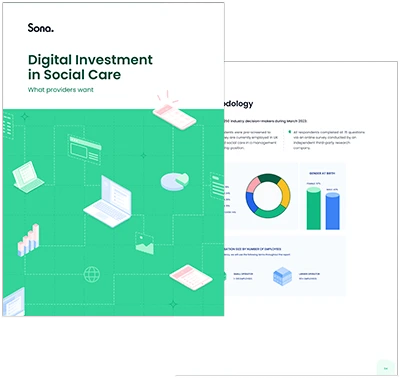
We asked 250 Social Care leaders about their attitudes towards digitisation and their plans for the next 12 months...
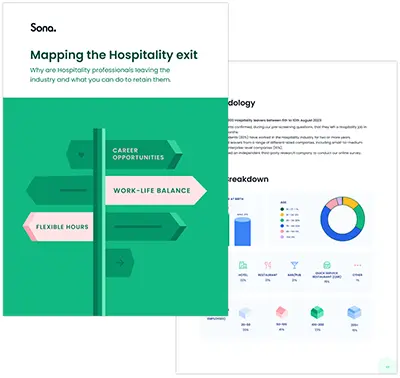
Why are Hospitality workers leaving the industry, and what can you do to retain them?
Share updates with a single click.

Staff can see relevant messages in one place.
Request post-shift feedback from staff.
Recognise staff contributions by sending them praise.
Identify staff at risk of churning.
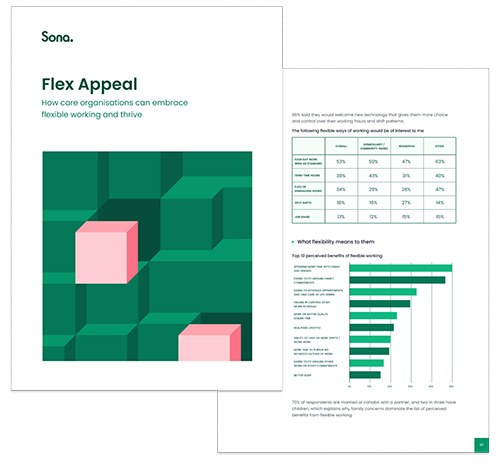
How care organisations can embrace flexible working and thrive.
Maintain quality of care and reduce costs.
Maximise profitability through AI-powered forecasting & scheduling.
Elevate your operational efficiency and guest satisfaction.
Streamline operations across sites.
Developed alongside Social Care experts with decades of combined experience.
See why we are the leading user-friendly, end-to-end platform that prioritises both efficiency and wellbeing.
The Sona Partner Network is an ecosystem of solution experts and complementary technologies.

Give staff greater visibility of shifts available to work, with a simple "shift claim" process to increase their income.
Improve employee engagement and retention with a seamless employee communication platform.
Happier staff provide greater customer experiences, which in turn drives return rates, revenues and recommendations.

Give staff greater visibility of shifts available to work, with a simple "shift claim" process to increase their income.
Improve employee engagement and retention with a seamless employee communication platform.
Happier staff provide greater customer experiences, which in turn drives return rates, revenues and recommendations.

Meet the Sona team online with our webinar series or in-person at an event near you.
New research, insights, and strategies for frontline leaders.
Downloadable templates, reports and guides from Sona.
Stay up to date with the latest Sona news and research.
Learn how our customers are transforming their people operations.
| 3 min read
Sona and Borderless announce an exciting partnership.
| 2 min read
Sona and Found by Lottie announce an exciting partnership.
| 4 min read
Remove operational errors, drive efficiency, and help your team spend less time on admin with a unified solution.
PUBLISHED: February 2025
Download the report to learn how hospitality operators are embracing AI challenges and opportunities in 2025.
PUBLISHED: January 2025
Reveal the most important metrics in 2025!
PUBLISHED: December 2024
This infosheet is packed with practical insights to drive high-quality, low-regret WFM purchases.Many Social Care workers feel under appreciated and undervalued–with two in five workers leaving their job due to not feeling appreciated enough. This webinar on Social Care recognition brings three field experts together to discuss how recognition is something many organisations fail to show to their workers, and it’s affecting employee churn rates. Join us to explore the steps needed to ensure workers are feeling appreciated, valued, and wanting to stay.
7 minute read
 Here are the key takeaways from our latest webinar “Does Social Care need a new culture of recognition?” with Social Care experts Oli Johnson, Adam Purnell, and Neil Eastwood.
Here are the key takeaways from our latest webinar “Does Social Care need a new culture of recognition?” with Social Care experts Oli Johnson, Adam Purnell, and Neil Eastwood.
00:12 | Introduction of topic and speakers
07:09 | Do we need a new culture of recognition in Social Care?
09:24 | Importance of internal recognition.
13:42 | Benefits of recognition in Social Care.
22:32 | Appreciation Matters research results.
29:44 | Should people give praise more frequently?
36:22 | Key steps to creating a new culture of recognition programme.
56:13 | Final thoughts and acknowledgments.
After attending Reykjavik University and obtaining an MBA from Harvard Business School, Oli returned to London where he co-founded three different companies: Rainmaking Loft, Catapult, and most recently, Sona, a workforce management solution.
Sona’s mission is to put technology in the hands of frontline staff—across sectors like health and Social Care—to transform how they manage their work and engage with employers.
Adam is a big advocate for change and action in the Social Care sector. Adam mainly focuses on promoting a positive feedback and recognition culture within the organisations.
He first realised he had a passion for Social Care at 18 after witnessing the outstanding care his own father received whilst he was ill. At 21, he scored his first managerial role and since then has acquired and shared his experience and expertise at a local and national level.
Adam enjoys taking part in ICS workforce meetings and events as well as speaking and providing peer support. His efforts have been nationally and internationally recognised.
Neil has worked in several organisations within the Health and Social Care sector, for over a decade. During this time, he founded two companies: Sticky People and Care Friends.
The first provides advice, tools, and support to Social Care and healthcare employers. The latter is an employee referral app for employers within this sector to expand their workforce based on personal recommendations from trusted staff.
Neil has also spent much of the last fourteen years writing a book: "Saving Social Care", which addresses the many challenges that the sector faces and provides tips to tackle these problems.
Social Care workers are constantly under enormous pressure, especially after the COVID-19 pandemic. Now more than ever, Social Care staff have more things to keep up with whilst trying to maintain a high standard of care.
Neil explains that, unfortunately, the more pressure workers are under, the less appreciation or recognition they receive. “The thing that loses out is that moment of saying ‘well done’ to somebody because you become task-oriented. And I think we’ve underestimated that we’ve lost the glue that keeps people coming into Social Care”.
This under appreciation makes workers feel discouraged, their physical and mental health as well as their self-perception suffer, and eventually many of these workers will choose to leave the Social Care sector. During the last few years, shortages rose to 52% leaving an average of 165,000 vacancies to fill.
Adam then points out how we “should look at the wider picture when it comes to recognition as well, because we always talk about leadership being top-down”. To him, praise and recognition need to also come from third-party sources.
“We always talk about how we learn from our leaders at the top and that sort of behaviour is learned and it transcends the ranks”, says Adam. That’s why government, regulators, and board of directors must instil a positive feedback and recognition culture into companies, that way managers are aware of it and pass it down to the care workers–cascading into a healthier, more constructive work environment.
Our speakers discussed some of the main benefits of recognition in Social Care, and they are rife:
The turnover rate in Social Care is at 31% compared to 15% across other sectors in the UK. Recognition could play a crucial role in staff retention by showing appreciation and encouragement for the hard work these people do.
On the one hand, pay needs to be raised but that alone is not going to necessarily attract or retain workers. On the other hand, appreciation is usually secondary or completely forgotten. It doesn’t cost anybody anything yet it does bring a big boost of encouragement for Social Care workers. 92% of them said that they would be a lot more satisfied with their current job and would be encouraged to stay if they were shown more recognition.
Sona’s research, Appreciation Matters, has some incredible findings. Its main results show:
Neil comments on how he’s not at all surprised by this data because the vast majority of employees who quit cited “personal reasons”, but according to him, “That doesn’t tell you the real reason why, and they probably don’t want to say to the manager that’s asking them that, ‘actually it was you that seemed to ignore me and didn’t support me’, so I think there’s certainly a lot more”.
On the contrary, Adam explains that he is surprised by how low the statistics are, given that the sector faces so many inconsistencies for workers, such as the lack of shift flexibility that Social Care organisations have. He says that “you’re instantly isolating people” if companies only provide 12-hour shifts or no shifts outside school hours. “Recognition is recognising people’s lives are different. People’s needs are different. People’s wants for working conditions are different”, he says.
Oli adds that the research shows how the number rises from 41% to 72% when the care workers who have seriously considered leaving their job are included. He mentions how the number rises even further, to 81%, when asked if praise was important, mentioning that the lack of it was the main cause for leaving their job. This is clear evidence as to why every care provider needs an employee recognition programme.
Improving working conditions will lead to having happier, more productive staff. Some of the key steps managers can start taking to support them include:
Lastly, from a managerial role, a simple step to take is to go around asking employees if they feel appreciated and recognized at work. This helps set up a positive environment for newcomers and makes leadership more approachable for all.
Social Care is in desperate need for a reform to its recognition culture. Compassionate leadership could fix many of the problems the field faces by showing workers they deserve appreciation and praise, and that their work is valued. Creating a positive workplace will lead to staff retention and greater overall satisfaction for organisations, staff, and the people being cared for.
If you liked this article, why not subscribe to our newsletter to get the latest news and views delivered straight to your inbox?
3 min read
The care sector is facing a serious workforce crisis. Employee recognition programmes offer a simple solution to the challenge of high staff turnover.
2 min read
According to our latest research, 79% of leavers are open to working in health and social care again in the future. Here are some practical steps health and social care organisations can take to reduce preventable labour turnover.
9 min read
Employee Appreciation Day is an opportunity for Social Care providers to recognise and engage their staff. Here are five inspiring initiatives.